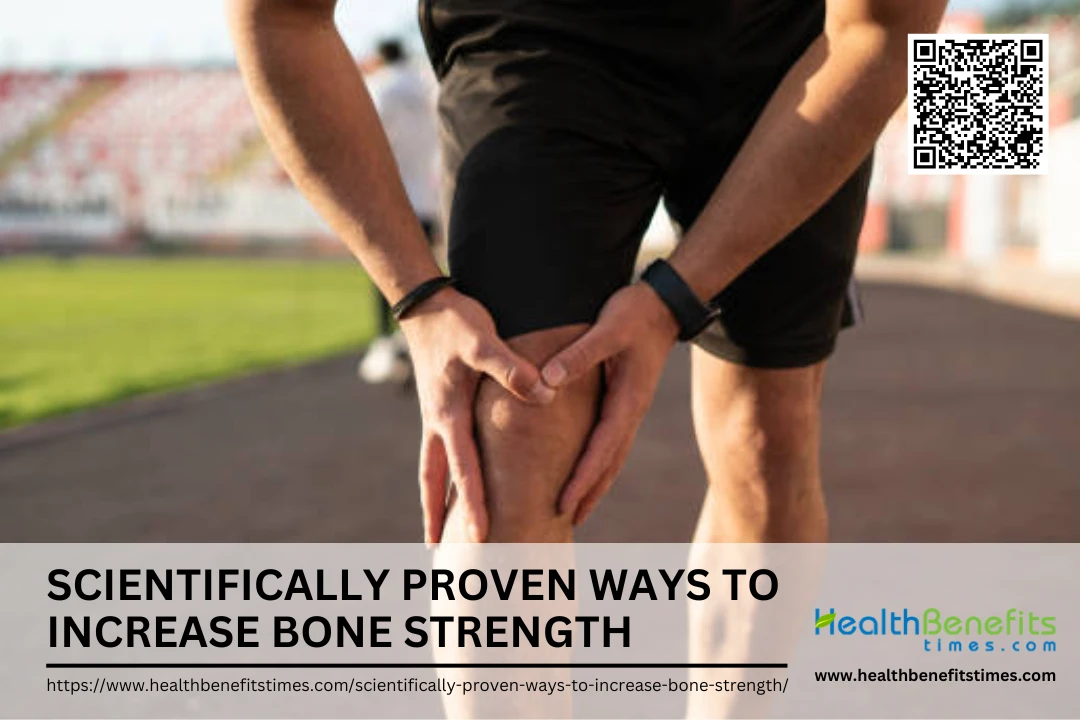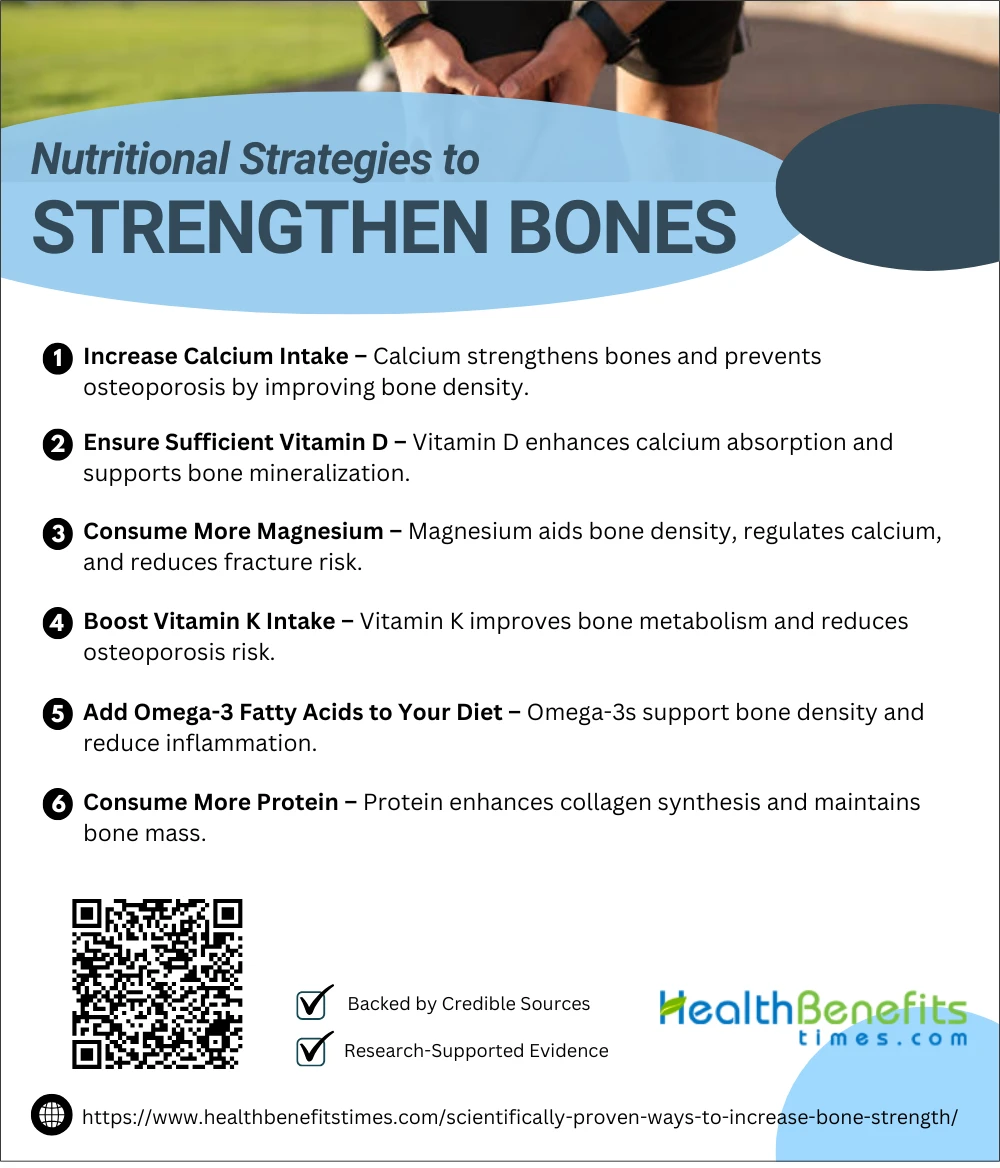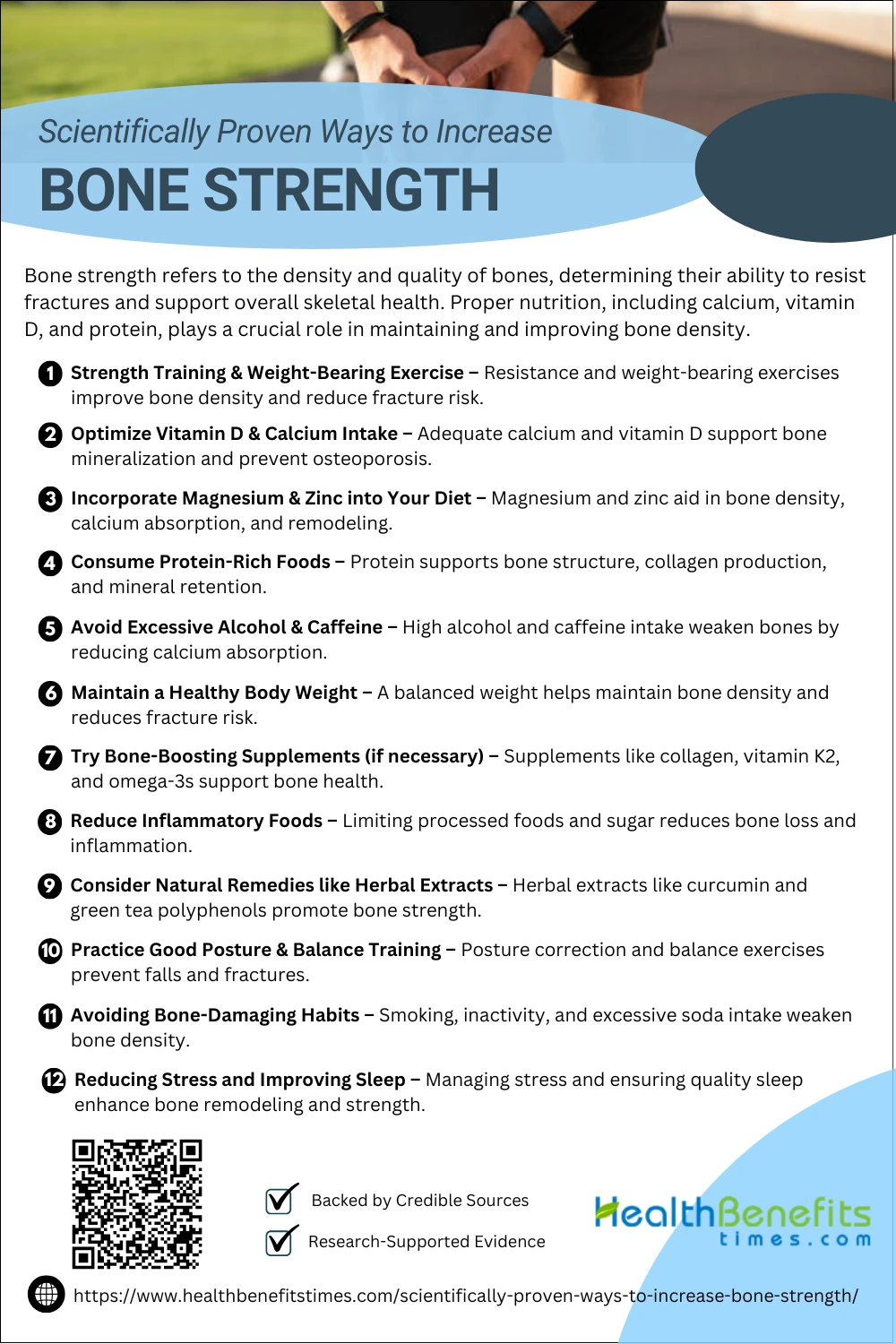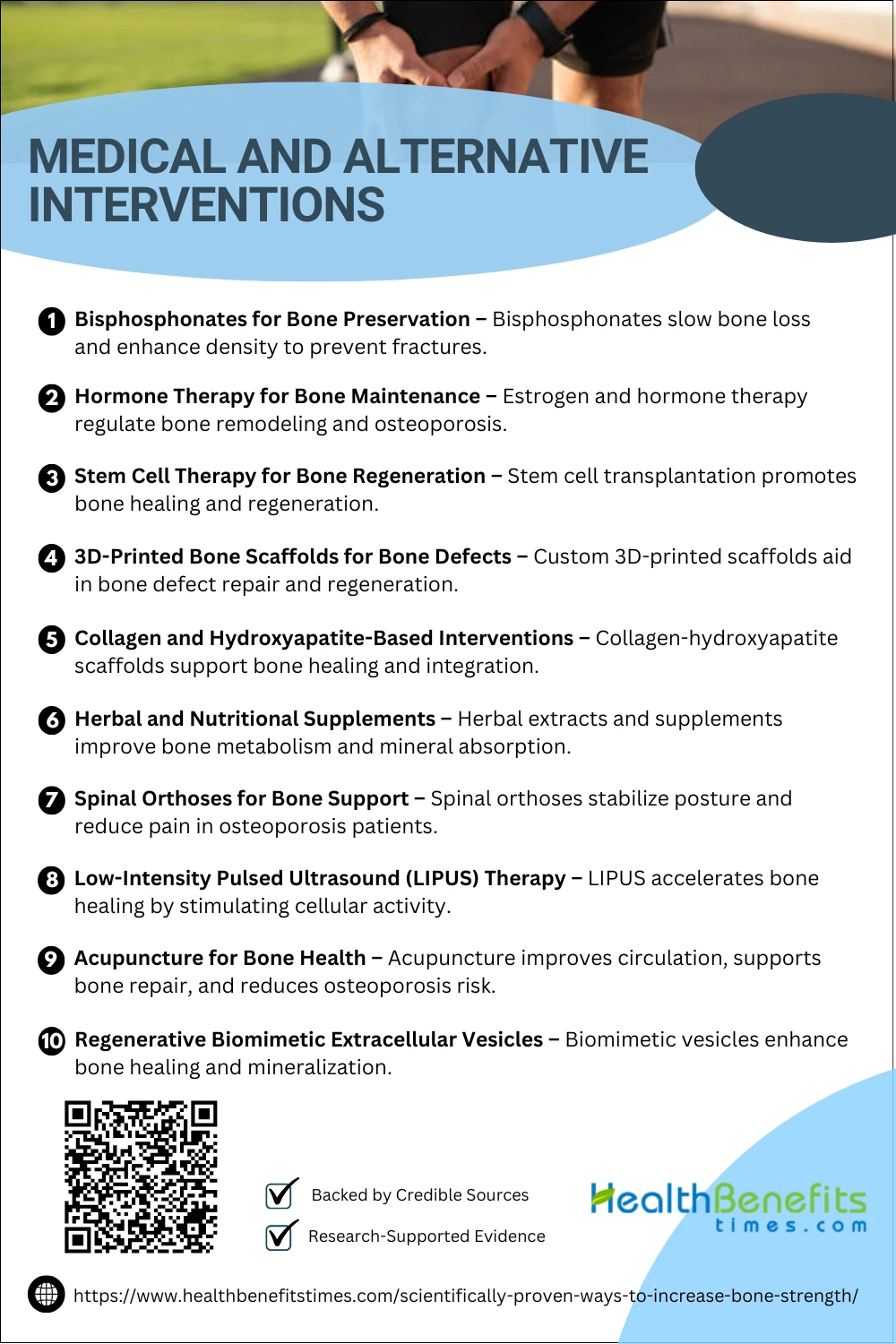- Bone strength refers to the density and quality of bones, determining their ability to resist fractures and support overall skeletal health.
- Proper nutrition, including calcium, vitamin D, and protein, plays a crucial role in maintaining and improving bone density.
- Regular weight-bearing exercises like strength training and walking stimulate bone growth and reduce the risk of osteoporosis.
 Bone strength refers to the combination of bone density and bone quality, which together determine the bone’s ability to withstand fractures and mechanical stress. Maintaining strong and healthy bones is essential for overall mobility and quality of life. Several scientific studies highlight that bone strength can be enhanced through a combination of dietary intake, physical activity, and medical interventions. Adequate levels of Vitamin D and calcium are crucial, as they play a key role in bone mineralization. Regular weight-bearing exercises, such as resistance training and impact activities, have been proven to stimulate bone remodeling and increase bone mineral density. Additionally, natural compounds like Salvianolic Acid B have been studied for their ability to support bone regeneration, particularly in osteoporosis patients. Emerging therapies, such as biomaterials and hydrogel-based treatments, are also being explored to improve bone repair and regeneration. For individuals at risk of bone deterioration, medical strategies such as spinal orthoses may help support bone structure and function. Recent meta-analyses also suggest that acupuncture may have potential benefits in increasing bone mineral density. Moreover, innovations in bioactive materials, such as cellulose-based scaffolds, show promising results in bone tissue engineering. As bone health is influenced by hormonal balance, studies indicate that sex hormones significantly impact bone mineral density in women. By integrating scientific approaches from nutrition, exercise, and advanced medical treatments, individuals can optimize their bone health and reduce the risk of osteoporosis.
Bone strength refers to the combination of bone density and bone quality, which together determine the bone’s ability to withstand fractures and mechanical stress. Maintaining strong and healthy bones is essential for overall mobility and quality of life. Several scientific studies highlight that bone strength can be enhanced through a combination of dietary intake, physical activity, and medical interventions. Adequate levels of Vitamin D and calcium are crucial, as they play a key role in bone mineralization. Regular weight-bearing exercises, such as resistance training and impact activities, have been proven to stimulate bone remodeling and increase bone mineral density. Additionally, natural compounds like Salvianolic Acid B have been studied for their ability to support bone regeneration, particularly in osteoporosis patients. Emerging therapies, such as biomaterials and hydrogel-based treatments, are also being explored to improve bone repair and regeneration. For individuals at risk of bone deterioration, medical strategies such as spinal orthoses may help support bone structure and function. Recent meta-analyses also suggest that acupuncture may have potential benefits in increasing bone mineral density. Moreover, innovations in bioactive materials, such as cellulose-based scaffolds, show promising results in bone tissue engineering. As bone health is influenced by hormonal balance, studies indicate that sex hormones significantly impact bone mineral density in women. By integrating scientific approaches from nutrition, exercise, and advanced medical treatments, individuals can optimize their bone health and reduce the risk of osteoporosis.
Understanding Bone Health
Bone health is determined by its composition, strength, and ability to remodel over time. Bones are primarily composed of collagen and calcium phosphate, which provide both flexibility and hardness to support bodily functions. Several factors influence bone strength, including genetics, diet, hormonal levels, and mechanical stress. The bone remodeling process involves continuous resorption and formation, crucial for maintaining skeletal integrity. Advancements in research, such as gradient bone scaffolds, have enhanced bone regeneration strategies for various conditions. Understanding these processes enables better approaches to maintaining lifelong bone health.
Nutritional Strategies to Strengthen Bones
Proper nutrition is essential for building and maintaining strong bones. Key nutrients like calcium, vitamin D, magnesium, and protein support bone density, prevent fractures, and reduce the risk of osteoporosis over time.
1. Increase Calcium Intake
Calcium is crucial for bone mineral density and strength, playing a vital role in preventing osteoporosis. Consuming dairy, leafy greens, and fortified foods ensures adequate calcium levels. Research confirms that higher calcium intake is associated with improved bone density and reduced fracture risk.
2. Ensure Sufficient Vitamin D
Vitamin D facilitates calcium absorption and bone mineralization, essential for maintaining skeletal strength. Studies suggest that adequate Vitamin D intake reduces the risk of fractures and osteoporosis.
3. Consume More Magnesium
Magnesium plays a vital role in bone mineralization and density, helping regulate calcium metabolism and reducing fracture risk. Research indicates that magnesium-rich diets improve bone strength and support overall skeletal health.
4. Boost Vitamin K Intake
Vitamin K is crucial for bone metabolism and calcium binding, supporting bone density and reducing osteoporosis risk. Studies suggest that adequate Vitamin K intake improves bone formation and reduces fracture susceptibility.
5. Add Omega-3 Fatty Acids to Your Diet
Omega-3 fatty acids help enhance bone density and reduce inflammation, promoting skeletal health. Research suggests that omega-3s from fish oil improve calcium absorption, supporting overall bone strength.
6. Consume More Protein
Protein is essential for collagen synthesis and bone mass maintenance, reducing fracture risk. Studies indicate that adequate protein intake enhances bone remodeling and supports skeletal integrity.
Scientifically Proven Ways to Increase Bone Strength
Strong bones are essential for overall health and mobility. Scientifically proven methods, including proper nutrition, exercise, and lifestyle changes, help improve bone density, prevent fractures, and reduce the risk of osteoporosis.
1. Strength Training & Weight-Bearing Exercise
Strength training and weight-bearing exercises stimulate bone remodeling, enhance bone mineral density, and reduce fracture risk. (1) Resistance training has been shown to be particularly beneficial for postmenopausal women in preventing osteoporosis. (2) Studies highlight the role of impact-based weight-bearing exercises in increasing bone density and reducing joint pain. (3) Research also confirms that progressive strength training helps in long-term bone health maintenance. (4) Implementing structured resistance and plyometric exercises further improves bone quality and strength. (5)
2. Optimize Vitamin D & Calcium Intake
Vitamin D and calcium work synergistically to increase bone mineral density and reduce fracture risk. (6) Research indicates that adequate intake of these nutrients is crucial in preventing osteoporosis and supporting bone remodeling. (7) A well-balanced diet, rich in calcium and vitamin D, is particularly beneficial for individuals with low bone density conditions. (8) Regular sun exposure combined with dietary supplementation optimizes calcium absorption and bone health. (9) Athletes and individuals with high physical activity levels can enhance bone resilience by maintaining proper levels of calcium and vitamin D. (10)
3. Incorporate Magnesium & Zinc into Your Diet
Magnesium and zinc play crucial roles in bone mineralization and density, aiding calcium absorption and bone remodeling. (11) Studies indicate that millet bran, rich in magnesium and zinc, enhances bone strength and reduces fracture risk. (12) Magnesium deficiency is associated with weaker bone structure and reduced bone matrix formation. (13) Zinc contributes to bone regeneration and helps maintain skeletal integrity. Ensuring a diet rich in nuts, seeds, whole grains, and legumes helps optimize magnesium and zinc levels for bone health.
4. Consume Protein-Rich Foods
Protein is essential for collagen production and bone structure, helping to maintain bone density and prevent fractures. (14) Research suggests that protein intake supports bone mineralization and growth, particularly in children and older adults. (15) A balanced diet including lean meats, dairy, legumes, and plant-based proteins improves bone resilience and reduces the risk of osteoporosis. Studies also indicate that protein enhances calcium retention, strengthening bones over time. (16) High-protein diets, especially those rich in animal and plant sources, contribute to improved bone remodeling and fracture healing. (17)
5. Avoid Excessive Alcohol & Caffeine
Excessive alcohol and caffeine intake can negatively impact bone mineral density by interfering with calcium absorption and bone formation. (18) Studies suggest that high caffeine consumption is linked to increased fracture risk in postmenopausal women. (19) Alcohol overconsumption accelerates bone resorption, leading to weakened bones. (20) Additionally, chronic alcohol use reduces bone formation and density over time. (21) Avoiding excessive caffeine and alcohol while maintaining a balanced diet can significantly improve bone health and longevity. (22)
6. Maintain a Healthy Body Weight
Maintaining a healthy body weight is essential for bone strength, as both underweight and obesity are linked to increased fracture risk. (23) Studies show that a normal BMI supports optimal bone density and reduces osteoporosis risk. A balanced diet with adequate protein, calcium, and Vitamin D plays a vital role in maintaining skeletal integrity. (24) Research confirms that weight-bearing exercises help in bone remodeling and reducing age-related bone loss. (25) Combining healthy nutrition, strength training, and weight management strategies is the key to long-term bone health. (26)
7. Try Bone-Boosting Supplements (if necessary)
Bone-boosting supplements like calcium, vitamin D, and collagen peptides support bone mineralization and reduce fracture risk. (27) Studies show that collagen supplementation enhances bone density and strength. Omega-3 fatty acids play a role in reducing bone loss and improving bone regeneration. Vitamin K2 is another critical supplement that improves calcium utilization and prevents bone weakening.
8. Reduce Inflammatory Foods
Chronic inflammation contributes to bone resorption and osteoporosis, making it essential to limit processed foods, refined sugars, and trans fats. (28) Studies confirm that high-fat and high-sugar diets negatively affect bone density and increase inflammatory markers. (29) Incorporating anti-inflammatory foods like turmeric, ginger, and omega-3 fatty acids can help counteract bone deterioration. (30) Research also suggests that polyphenol-rich fruits such as jabuticaba enhance bone health and combat inflammation. (31) A Mediterranean diet, rich in whole grains, leafy greens, and healthy fats, has shown benefits in preserving bone mass. (32)
9. Consider Natural Remedies like Herbal Extracts
Herbal extracts such as Curcumin, Salvianolic Acid B, and Epimedium have shown potential in promoting bone formation and reducing bone loss. (33) Turmeric and ginger extracts possess strong anti-inflammatory properties, which support bone density and reduce osteoporosis risk. (16) Studies confirm that traditional Chinese herbs like Eucommia ulmoides and Cuscuta chinensis help stimulate bone regeneration. (34) Ashwagandha and Boswellia serrata are also recognized for enhancing bone strength and mineralization. (35) Green tea polyphenols have further demonstrated a protective effect against bone deterioration, reducing the risk of fractures.
10. Practice Good Posture & Balance Training
Maintaining proper posture and engaging in balance training exercises can significantly reduce the risk of falls and fractures. (36) Yoga and Tai Chi improve flexibility, core strength, and stability, contributing to better bone health. (37) Studies suggest that correct spinal alignment reduces excessive pressure on bones, preventing degenerative issues. (38) Physical therapy and proprioceptive training enhance muscle coordination, reducing the likelihood of osteoporosis-related fractures. (39) Research also supports that integrating posture-focused strength training helps maintain optimal bone mineral density. (5)
11. Avoiding Bone-Damaging Habits
Certain lifestyle habits, such as smoking, excessive alcohol consumption, and prolonged inactivity, can significantly weaken bones and increase fracture risk. (40) Studies highlight the negative impact of smoking on bone density and mineralization. (41) Chronic stress and poor dietary choices contribute to inflammation, accelerating bone loss. (42) Additionally, high soda consumption is linked to reduced calcium absorption. (43) Avoiding these harmful habits while maintaining a balanced diet and active lifestyle can promote long-term bone health. (44)
12. Reducing Stress and Improving Sleep
Chronic stress and inadequate sleep negatively affect bone remodeling, increasing osteoporosis risk. (45) Studies confirm that stress hormones like cortisol impair bone formation and accelerate bone resorption. (46) Improving sleep quality through consistent sleep cycles and relaxation techniques supports bone density maintenance. (36) Research suggests that meditation, yoga, and physical activity help reduce stress-related bone loss. (47) Moreover, adequate melatonin production enhances calcium absorption and bone strength. (48)
Medical and Alternative Interventions
Medical and alternative interventions help maintain bone strength by combining medications, supplements, and holistic approaches. These methods support bone density, prevent fractures, and manage conditions like osteoporosis for long-term skeletal health.
1. Bisphosphonates for Bone Preservation
Bisphosphonates help reduce bone loss and enhance bone density, making them effective for treating osteoporosis and preventing fractures. (49) Research highlights that sequential bisphosphonate therapy improves long-term bone strength and minimizes post-treatment bone loss. (50)
2. Hormone Therapy for Bone Maintenance
Estrogen and other hormone therapies regulate bone remodeling and slow down osteoporosis progression, particularly in postmenopausal women. (51) Research confirms that hormonal regulation of calcium and phosphate homeostasis is essential for maintaining bone health. (52)
3. Stem Cell Therapy for Bone Regeneration
Stem cell therapy has shown promising results in enhancing bone regeneration and healing fractures through mesenchymal stem cell (MSC) transplantation. (53) Research suggests that personalized 3D-printed bioactive scaffolds with MSCs improve osteogenic differentiation and bone healing. (54)
4. 3D-Printed Bone Scaffolds for Bone Defects
3D-printed bone scaffolds are revolutionizing bone defect treatments by providing customized, biocompatible structures that enhance osteogenesis. (55) Studies indicate that polymer-based scaffolds integrated with nanoparticles improve bone tissue regeneration and mechanical strength. (56)
5. Collagen and Hydroxyapatite-Based Interventions
Collagen-hydroxyapatite scaffolds are widely used for bone regeneration and trauma repair, mimicking the natural bone matrix to enhance osteoinductivity. (57) Studies highlight that hydroxyapatite grafts improve bone integration and accelerate bone healing in critical bone defects. (58)
6. Herbal and Nutritional Supplements
Herbal and nutritional supplements such as stinging nettle and hemp extracts have been studied for their role in enhancing bone metabolism and mineral absorption. (59) Research also supports that Isorhamnetin, a flavonoid-rich herbal extract, has anti-osteoporosis effects by promoting bone formation.
7. Spinal Orthoses for Bone Support
Spinal orthoses help stabilize the spine, reduce pain, and improve posture in individuals with osteoporosis or spinal disorders. (60) Research highlights that biomechanically optimized spinal orthoses enhance musculoskeletal support and mobility. (61)
8. Low-Intensity Pulsed Ultrasound (LIPUS) Therapy
LIPUS therapy has been shown to accelerate bone healing and improve osteogenesis by stimulating cellular activity. (62) Studies indicate that LIPUS enhances bone regeneration by modulating inflammatory responses and promoting tissue repair. (63)
9. Acupuncture for Bone Health
Acupuncture has been found to improve blood circulation to bone tissue, enhancing bone repair and reducing osteoporosis risk. (64) Studies indicate that acupuncture effectively stimulates bone metabolism and helps in fracture healing. (65)
10. Regenerative Biomimetic Extracellular Vesicles
Biomimetic extracellular vesicles are being explored as a novel regenerative therapy for osteoporosis, promoting bone healing and mineralization. (66) Research suggests that biomineral-loaded extracellular vesicles enhance targeted bone repair and osteogenesis. (67)
Bone Health across Different Life Stages
Bone health is a lifelong process, requiring proper nutrition, physical activity, and medical interventions to optimize bone strength and prevent degenerative diseases such as osteoporosis. Each life stage presents unique challenges and opportunities for maintaining skeletal integrity. Below is a detailed breakdown of bone health across different stages of life, supported by scientific research.
1. Infancy & Early Childhood: Building the Foundation for Bone Health
Infants and young children experience rapid skeletal growth, requiring adequate calcium, vitamin D, and other essential nutrients. Bone mineralization begins during fetal development, and newborns rely on maternal nutrition and breast milk or formula for early bone strength.
2. Childhood & Adolescence: The Peak Bone Growth Phase
This is the most crucial stage for bone mass accumulation, as 90% of peak bone mass is developed by the end of adolescence. Proper nutrition and exercise lay the groundwork for strong bones in adulthood.
3. Young Adulthood (20s to 30s): Maintaining Bone Density
During young adulthood, bone density stabilizes. This is a critical phase to maintain strong bones and prevent early degeneration. While bone mass doesn’t grow significantly after adolescence, healthy habits ensure long-term strength.
4. Pregnancy & Lactation: Increased Nutritional Demands
Pregnancy increases the demand for bone-building nutrients as the body supports both the mother and the developing fetus. Hormonal changes impact calcium absorption, making proper intake essential.
5. Middle Age (40s to 50s): Preventing Bone Loss
Bone loss begins gradually in the 40s, especially in women approaching menopause. Declining estrogen levels in women and testosterone in men increase the risk of osteoporosis.
6. Menopause & Andropause: Managing Hormonal Bone Loss
Menopause results in a sharp decline in estrogen, leading to accelerated bone loss. Andropause, the male equivalent, reduces testosterone levels, affecting bone mass.
7. Older Adults (60s and Beyond): Preventing Osteoporosis & Fractures
Aging naturally results in bone weakening, increasing the risk of osteoporosis and fractures. At this stage, fall prevention and bone-strengthening strategies are critical.
8. Frail Elderly: Managing Bone Fragility & Mobility
At this stage, bones become more fragile, increasing the risk of fractures and reduced mobility. Medical interventions and lifestyle modifications are necessary to maintain independence.
Conclusion
Improving bone strength requires a combination of proper nutrition, regular exercise, and healthy lifestyle choices. Consuming adequate calcium and vitamin D, engaging in weight-bearing and strength-training exercises, and avoiding harmful habits like smoking and excessive alcohol intake can significantly enhance bone health. Additionally, medical and alternative interventions, including bone density tests and supplementation, can help prevent and manage osteoporosis. By adopting these scientifically proven strategies, you can maintain strong bones, reduce fracture risks, and support overall well-being throughout life.





